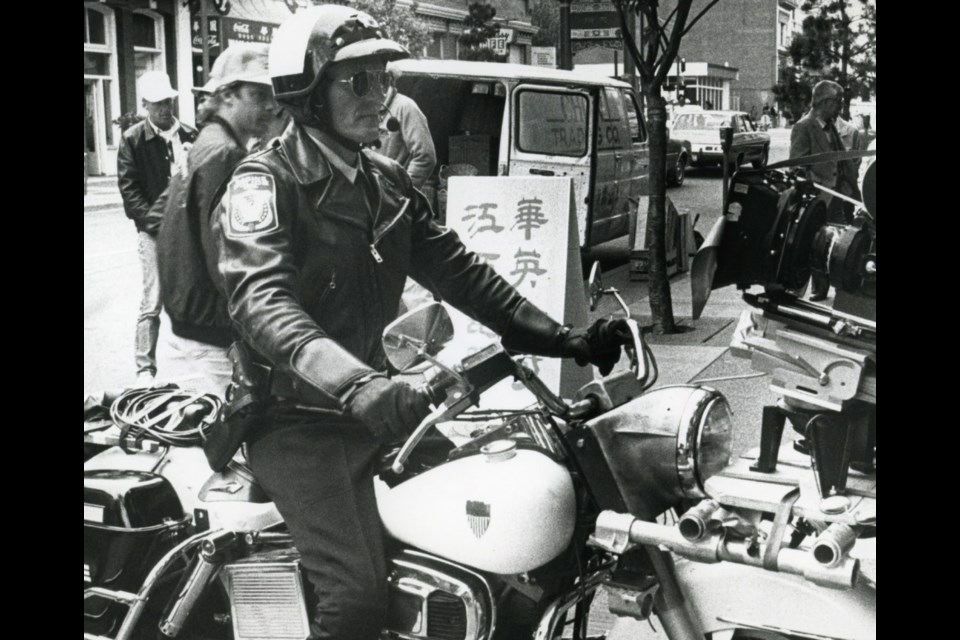When John Badham appeared at VanCity Theatre last Saturday to celebrate the 40th anniversary of his 1977 megahit Saturday Night Fever, he was 28 years older than when he filmed Bird on a Wire in Victoria.
The Hollywood director’s disarming wit and affability that endeared him to local crews who worked on Bird on a Wire here in 1989 was noticeably intact.
After waxing nostalgic about Saturday Night Fever, Badham, 77, briefly reminisced about shooting sequences for the action-comedy, which starred Mel Gibson and Goldie Hawn.
“Victoria was such a wonderful place to shoot,” recalled Badham, back in Vancouver, where he filmed the 1987 crime comedy Stakeout, to direct an episode of the TV series Supernatural.
“People love to make movies there [in Victoria],” Badham said. “You love to be with people who love to make movies, not with people who say: ‘Oh, where’s my paycheque? I want to go home.’ ”
Indeed, it was hard to miss Badham and his crews during their high-profile shoot that saw downtown Victoria masquerade as Racine, Wisconsin.
His Bird on a Wire locations included Market Square, the Carnegie Building, Bastion Square and Chinatown, where a motorcycle chase scene through Fan Tan Alley was a notable highlight. Recreating a small town in the American midwest here was much different than shooting Saturday Night Fever in pre-gentrified Brooklyn in the mid-1970s, he said.
“I grew up in Birmingham, Alabama. I hadn’t even visited Brooklyn until two weeks prior,” said Badham, who also appeared at a post-screening reception hosted by the Director’s Guild of Canada’s B.C. chapter.
It was part of Vancouver International Film Festival’s series of special events at its headquarters leading up to this year’s showcase that begins Sept. 28.
Badham incredulously recalled how locations for Saturday Night Fever hadn’t even been secured or its stars, other than Travolta, confirmed by the time he arrived two weeks before shooting began.
There was a tight timeline, since Travolta would have to shoot Grease immediately after with Olivia Newton-John, who had cleared her concert schedule to do it.
“The movie was really a placeholder before Grease,” Badham said.
Bolstered by Travolta’s multi-layered, career-launching performance as Tony Manera, the swaggering, discontented Brooklyn hardware-store employee and disco-dance competitor who lives for Saturday nights, and a terrific Bee Gees soundtrack, Badham’s film evocatively conveyed the impact of disco-mania. It also surpassed expectations, he recalled.
“But it was disrespected at first,” said the English-born director, recalling a scathing Variety review describing it as “an updated 1970s version of the Sam Katzman rock music cheapies of the ’50s.”
The review criticized the R-rated film’s raunchy dialogue and situations, and called it “a more shrill, more vulgar, more trifling, more superficial and more pretentious exploitation film.”
Watching Badham’s restored director’s cut, the film’s darker elements, including a rape scene and profanity that was shocking even by today’s standards, seemed more intense than I recalled.
“People forget how gritty it is,” said Badham, who was inspired by Mean Streets when directing Norman Wexler’s screenplay. The Saturday Night Fever script had been based on Nik Cohn’s New York magazine article headlined Tribal Rites of the New Saturday Night. Badham said Martin Scorsese’s 1973 classic helped him evoke New York’s street scene and dramatize a young Italian-American man’s attempt to rise above his apparent lot in life.
“Thank you, Marty,” said Badham, whose re-released first studio picture since his feature debut, the baseball movie The Bingo Long Traveling All-Stars & Motor Kings, is available on Blu-Ray.
Badham, whose subsequent Hollywood hits include War Games and Blue Thunder, wasn’t afraid to acknowledge his initial lack of familiarity with the milieu and disco craze.
“I didn’t get it. I don’t know who this is about,” he remembered telling Robert Stigwood, the Australian producer who financed the low-budget picture and hired Badham after firing original director John Avildsen.
“On the day Avildsen gets his Oscar for Rocky, he gets fired from this movie,” Badham recalled during a post-screening Q&A with film scholar Michael van den Bos.
Badham had high praise for Travolta, who was 23 at the time and had rigorous dance training for weeks before filming began.
He didn’t agree with Travolta’s original colour choice for his iconic disco suit, however. Travolta wanted a black suit, suggesting it would make him look cool, but Badham pushed for a lighter colour.
Badham managed to persuade Travolta to change his mind by telling him his co-star, Karen Lynn Gorney, would be wearing a dress that would effectively upstage his black suit, he recalled.
“He came back with two white suits,” said Badham, whose costume designer, Patrizia von Brandenstein, bought them off the rack in Brooklyn.
After Travolta worked up a sweat wearing one, he’d be given a fresh suit while crew members used hairdryers to dry the wet one, he recalled, noting he could understand Travolta’s yearning.
“Even in Reservoir Dogs, everybody wants to be Mr. Black, right?”
